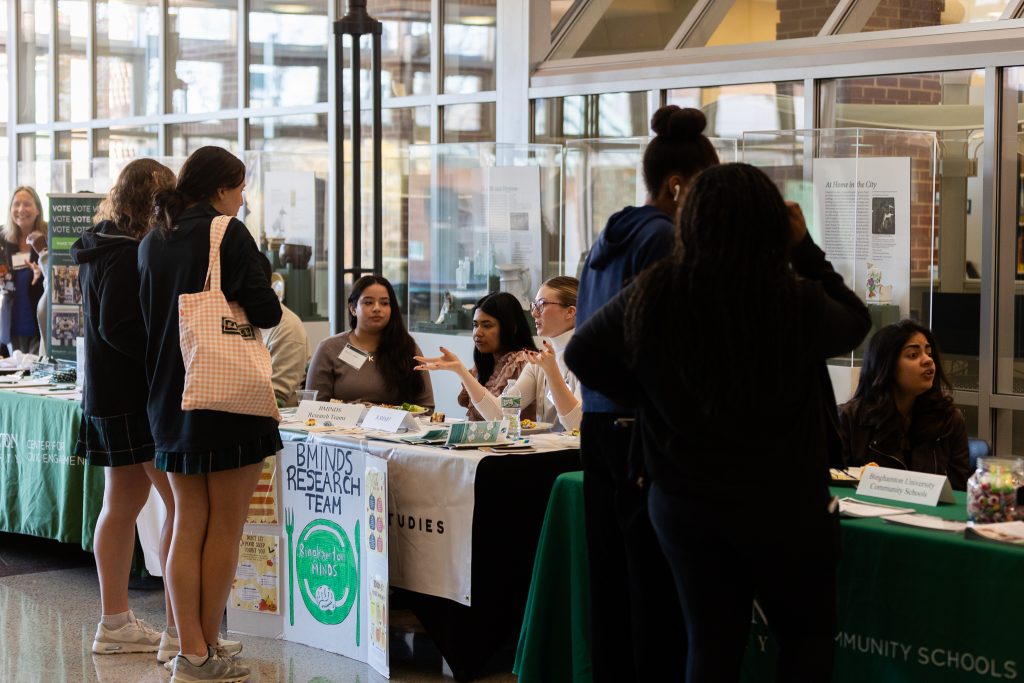The “Let Us Dream” conference, founded by Father Lijo Thomas in 2017, brought together Binghamton nonprofit and advocacy groups this Friday at the University Downtown Center.
This year’s conference included keynote addresses by Stacey Shipe, the chair of the College of Community and Public Affairs’ social work program, and Amy Rice of the Astor D. Rice Foundation. Panel discussions included community initiatives, addiction recovery and artificial intelligence.
During her talk, Shipe addressed the audience, first discussing child abuse prevention. She described the different types of maltreatment children experience, emphasizing child neglect as a prevalent and often ignored form of abuse. She cited evidence about racial and class inequalities within the child welfare system.
She detailed essential reform to Child Protective Services to better protect children, highlighting four key changes she hopes to see — stronger economic support for families, quality care and education for young children, altering the ways people think and speak about abuse while focusing on preventative rather than punitive care.
Shipe gave the audience opportunities to share their thoughts and ideas, including a word cloud and an interactive exercise, where individuals were encouraged to brainstorm solutions to a real-world example of fatal child maltreatment.
“Child maltreatment is a social issue,” Shipe said. “It’s not an individual one, and the child welfare system cannot handle it alone. It simply doesn’t have the resources necessary to mitigate the negative human, social and economic outcomes of child abuse and neglect.”
Shipe concluded her speech with a call to action, including eight ways her audience could actualize what they learned, including volunteering, educating oneself and others, reporting abuse and advocating for better child care.
After a brief break, attendees split up to listen to different panels. One panel, “Creating Place: Inclusive Community Initiatives Through Engaged Learning” focused on educational programs, like the Black art program at the Binghamton Art Museum and the American Civic Association. Panelists discussed the ways their organizations help to educate people, placing a special emphasis on diversity and inclusion.
At “Empowering Voices in Addiction Recovery,” panelists discussed BU and Broome County programs to help students and community members make healthier eating choices and reduce addiction harm. The panel included two BU students — Ushima Chowdhury, the lead research assistant with BMINDS and a senior majoring in biochemistry, and Kayla Taufman, a lead researcher with B-SMART and a senior majoring in psychology.
“A.I. and its Place in Diversity and Inclusion in Community Initiatives” discussed the role technology and A.I. play in their work, focusing mainly on social media. In the Q&A following the panel, an attendee asked about the potential blind spots of a diversity panel composed exclusively of white women, sparking a conversation about privilege and opportunities for diversification. One panelist seemed to take offense to the question.
“It rankles me when people make assumptions about me just because I’m an old, fat white lady,” said Janet Kent, co-founder of the nonprofit It’s Raining Lemonade. “You know, nobody knows what anyone has gone through.”
Jonathan Shaw, a senior majoring in social work interning at Owego Elementary School, said his experience at the conference inspired him to pursue new ways of celebrating diversity with the students at Owego. He said he wants to ensure they are getting educated during Black History Month and Pride Month, and he’s thinking about forming a multicultural club for the students there.
Rice, the founder and director of the Astor D. Rice Foundation, gave the closing keynote address and spoke about the foundation’s work throughout the local community. Founded in honor of her father, the organization’s mission is to “enhance the lives of individuals and families,” establishing support within the community and providing services and partnerships with “like-minded stakeholders.”
“His values of love, compassion, accountability and unwavering generosity shaped not only our family, but extended to our community and neighborhoods as well,” Rice said during the address. “Growing up, we lived very, very much below the poverty level, yet my father shared everything we had to make sure that others had what they needed.”
She recalled how neighborhood kids would come to her house for meals, a place to sleep and support not offered at their own homes. Her parents would wait until those children were fed before taking any for themselves.
After several awards celebrating “changemakers” in the community were handed out — with recipients including State Sen. Lea Webb and Rice herself — Thomas was also honored with a special changemakers award and praised for his continued faith in human beings and patience with a diverse group of people.
In an interview, Thomas remarked that he was pleased with the number of organizations coming to the “Let Us Dream” conference each year, and he has enjoyed seeing young people and seniors “mutually sharing stories and values, or their visions and dreams” and putting in the work to better their community. He said he came out of this conference inspired to work with youth volunteers to connect with people in his neighborhood and reduce loneliness.
He then gave his closing remarks, highlighting the power that people have to make a difference in the world. He continued by saying that a voice makes sense whereas a noise — like social media — does not.
“So if you reduce that noise, we can build that voice,” Thomas said. “Every single one of you [is] here with a voice. That voice makes some sense. That voice makes some impact in our community. Again, when we have [a] voice or voices, we have harmony.”



